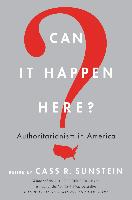?What makes Trump immune is that he is not a president within the context of a healthy Republican government. He is a cult leader of a movement that has taken over a political party ? and he specifically campaigned on a platform of one-man rule. This fact permeates ?Can It Happen Here? . . . which concludes, if you read between the lines, that ?it? already has.? ? New York Times Book Review
From New York Times bestselling author Cass R. Sunstein, a compelling collection of essays by the brightest minds in America on authoritarianism.
With the election of Donald J. Trump, many people on both the left and right feared that America's 240-year-old grand experiment in democracy was coming to an end, and that Sinclair Lewis' satirical novel, It Can't Happen Here, written during the dark days of the 1930s, could finally be coming true. Is the democratic freedom that the United States symbolizes really secure? Can authoritarianism happen in America?
Acclaimed legal scholar, Harvard Professor, and New York Times bestselling author Cass R. Sunstein queried a number of the nation's leading thinkers. In this thought-provoking collection of essays, these distinguished thinkers and theorists explore the lessons of history, how democracies crumble, how propaganda works, and the role of the media, courts, elections, and "fake news" in the modern political landscape?and what the future of the United States may hold.
Contributors include:
Martha Minow, dean of Harvard Law School
Eric Posner, law professor at the University of Chicago Law School
Tyler Cowen, economics professor at George Mason University
Timur Kuran, economics and political science professor at Duke University
Noah Feldman, professor of law at Harvard Law School
Jonathan Haidt, social psychologist and Professor of Ethical Leadership at New York University's Stern School of Business
Jack Goldsmith, Professor at Harvard Law School, Senior Fellow at the Hoover Institution, and co-founder of Lawfare
Stephen Holmes, Professor of Law at New York University
Jon Elster, Professor of the Social Sciences at Columbia University
Thomas Ginsburg, Professor of International Law and Professor of Political Science at the University of Chicago and a member of the American Academy of Arts and Sciences
Cass R. Sunstein, Robert Walmsley University Professor, Harvard University
Duncan Watts, sociologist and principal researcher at Microsoft Research
Geoffrey R. Stone, University of Chicago Law school professor and noted First Amendment scholar

